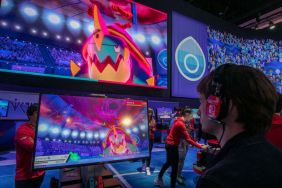Can you think of a single instance where your console maker of choice unequivocally “won” E3 consecutive years in a row? I can’t. I’d wager that it’s almost impossible. The nature of an E3 press conference is such that it requires showmanship, bombast, and an unwieldy heap of software and hardware designed primarily to bury the competition under its sheer size and weight. Somewhere along the line, the goal of press conferences became not to promote yourself, but to defeat the opponent, and any company foolhardy enough to believe it can win E3 every year has serious arrogance issues. I’m looking at you, Sony.
It’s nothing personal against Yoshida and the gang, though — that’s just how things went this time around. Nintendo’s last press conference homerun was 2010, where the company not only revealed Donkey Kong Country Returns, Luigi’s Mansion Dark Moon, and Kirby’s Epic Yarn, but demoed the first worthwhile example of 1:1 Wii swordplay in The Legend of Zelda: Skyward Sword, and unveiled a handheld with a no-glasses-required 3D screen. The showing was rife with meme-tastic Reggie quotes and booth babes to show the new system off, and Nintendo was so confident that it even began its in-conference 3DS demo just minutes before the end of the presentation. This caused some journalists to miss the beginning of Sony’s showing entirely if they chose to give it a try. Talk about arrogant swagger — but such things rarely pay off long term.
As such, the next year Nintendo was handily trounced, and the 3DS was not faring well at all (a month later it would require a price drop to recover). It was somewhere around that time that the Japanese giant I think began to wonder — what are we really getting out of this? Do we control our own E3 fate? The line between divine victor and punching bag for the competition is remarkably thin at E3, and toeing it is a task too precise for the mere mortals who show up yearly to compete. It’s a lot like Mario Kart 8, really. It doesn’t matter how good you are, because there’s always a chance that a Blue Shell will unravel your plans and send you packing. Winning consistently is impossible, and the sooner companies learn this, the better.

So what, then, is the solution to E3’s treacherous corporate clash? The answer lies in controlling your own message. Nintendo has done this two years running now, and though last year’s E3 Direct was more of a stumbling first try, Kyoto really nailed it this year with its YouTube-streamed Digital Event. Truth be told, I don’t think Nintendo would have won E3 2014 bringing the same content and reveals to a traditional press conference, but because they packaged it properly and focused on fans rather than press, they’ve successfully walked away with the most buzz. As a Nintendo fan and games writer by trade it pains me slightly that I was largely obsolete in delivering Nintendo info to the masses, but this is the future; why employ a middleman when you don’t have to? Besides, such an approach allows the middleman to focus on opinion and analysis over simple regurgitation — a win-win for everyone involved.
With Nintendo out of the press conference picture, it puts a white-hot light on Sony and Microsoft; one that questions how much can really be gained by a never-ending two-company slugfest. Sure, Sony cleaned up last year, but oh! In a brutal twist of fate, it was Microsoft who performed better in 2014! Will Sony prevail again in 12 month’s time? Two leviathans taking turns clobbering each other just isn’t as exciting as three, and suffering a yearly PR shiner that takes 12 months to avenge can’t be worth all the time and money. It’s time to forget the other guy and turn inward, and though it may not happen overnight, I firmly believe Digital Event-like strategies are where E3 is headed.
Of course, the shift won’t be free of problems, and I’ve already noticed a few cropping up in the wake of this year’s show. Take Xenoblade Chronicles X, the upcoming Monolith RPG for Wii U. There’s been a fair bit of outrage amongst fans at its exclusion from game of show nominations, while other non-playables such as Metal Gear Solid V made the cut. To anyone who attended E3, the distinction is obvious; Konami showed MGS V in a theater at its booth all week, delivering a fantastic demo and focusing on very little else. Xenoblade, on the other hand, was nowhere to be found outside of its trailer. From a fan perspective, though, the story is almost completely opposite. Nintendo showed off lots of great Xenoblade gameplay during its Treehouse stream on Twitch, demoing new features and revealing, arguably, more content and awesomeness than MGS V did. Showgoers, not watching Twitch, had no way of knowing this (unless they coincidentally wandered to the Treehouse set at Nintendo’s booth during that time), and viewers at home, not privy to the MGS V private showing, had no way of understanding what press folks saw outside of written impressions. It’s a nasty disconnect, and one that will need to be dealt with if and when Sony and Microsoft get in on Nintendo’s E3 live-streaming action.

Ultimately, this discussion culminates with an interesting and perhaps sensitive topic; if publishers control their own message via live-streams and the internet, what exactly is the point of E3? We live in a world where folks spectating from the couch know more about E3 news and goings-on than those who actually attend (and trust me, catching up on the day’s events after hours of traversing the show floor is not as fun as it sounds), and as a result it may only be a matter of time before we see a drastic shift in the show’s overall purpose. I’m sure if Nintendo had its way they’d forego the show entirely, depending on Nintendo Directs and well-timed Best Buy demos to deliver info about their games directly to the folks buying.
E3 is a spectacle, and one I hope will never fully go away; especially since this was my first ever year in attendance. But as I look around a week later and see black-eyed publishers nursing wounds at the hands of one or two victors, and gaming websites handling angry confusion from riled readers and fans, I can’t help but wonder if everyone might be better off just fending for themselves.








